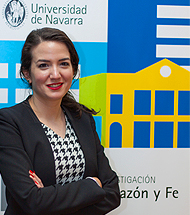"Techno-optimism is not something new, it occurred in the Enlightenment and the Industrial Revolution before the 1990s."
Sara Lumbreras, PhD in Engineering, will give the last seminar of the year at the group "Science, Reason and Faith" (CRYF) of the University of Navarra.

The group "Science, Reason and Faith" of the University of Navarra (CRYF) closed 2016 with a seminar graduate "Tecnooptimism: Near future or false promise?", given by Sara Lumbreras, PhD in Industrial Engineering and professor at Comillas Pontifical University.
During her talk at exhibition, Sara Lumbreras explained that techno-optimism defends the idea that in the future we will achieve ideal living conditions for all humanity and that this will be achieved thanks to technology. And she recalled that "techno-optimism is not something new, there have been three key moments in history in which social progress was already equated with technological progress: in the Enlightenment, in the Industrial Revolution and in the 1990s in California (United States) with the boom of Internet companies. This is the moment in which we find ourselves".
In her message, the expert emphasized that any form of optimism has a dual nature: "The utopia that leads us to identify a goal andwork to improve, or the one that leads us to trust that the future will solve our problems. If we are going to have abundance, is it necessary to fight for equality?".
Sara Lumbreras recalled that not all the promises of techno-optimism are supported by facts. She affirmed that there is a "fundamental" failure and that it is assumed that "the technological development is the one that guide advances society and that technology is always positive, while it is society that has to decide where technology advances". To explain this, he gave the example of transgenic foods: "Have they been used to end hunger in the world or have they served to make a particular business richer?"
"Essence is not the same as appearance."Another of the ideas defended by techno-optimism is the possibility of defeating death by renouncing the biological substrate of the human being, copying our neuronal interconnections and taking them to a virtual reality. According to Sara Lumbreras, we would again be making a mistake by thinking that essence is the same as appearance: "Even if I could build a simulation of myself, I have no doubt that it would not be me, and I have no doubt that it would not be a copy of me with a consciousness parallel to my own".
One of the ideas that the speaker supported was that it seems clear that we have changed the way we die: "At first we died a violent death, in wars, in hunting accidents; then, when settlements became larger, from infectious diseases; and, now, from diseases that we associate with aging. If we continue to advance in medicine, we may move on to a fourth era in which we will die from another subject of diseases".





